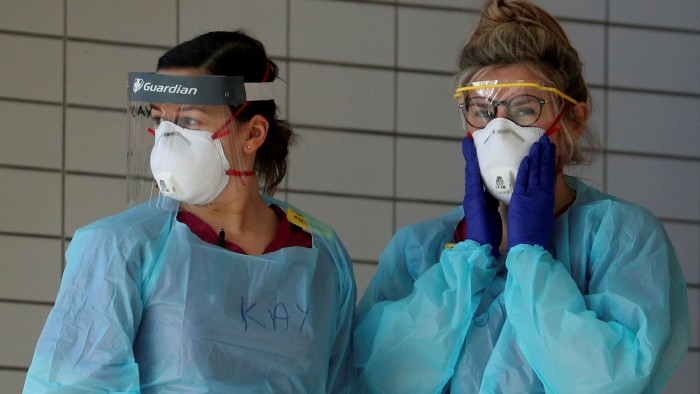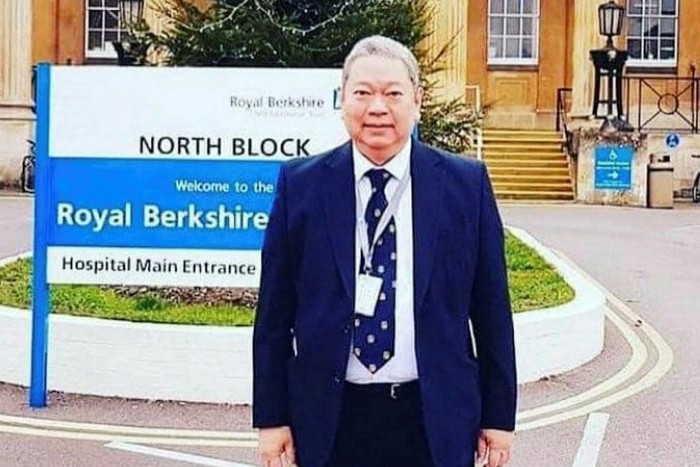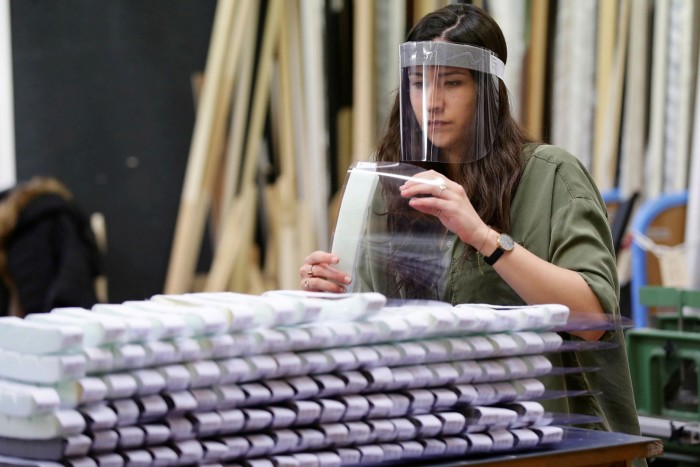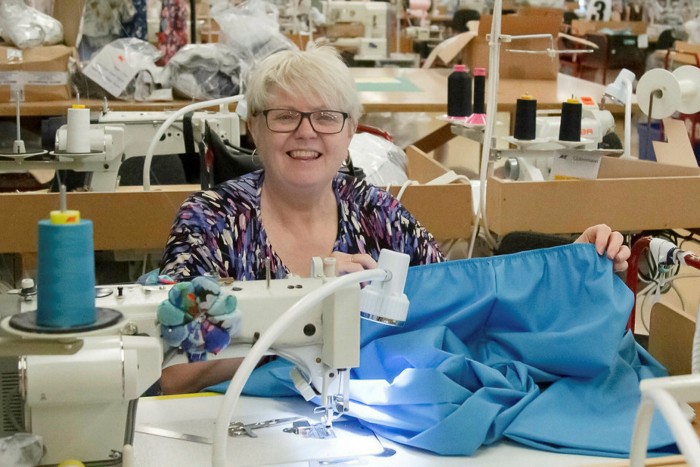NHS staff still face shortages of antivirus kit | Free to read

Roula Khalaf, Editor of the FT, selects her favourite stories in this weekly newsletter.
When Peter Tun, a doctor in the UK’s National Health Service, died of coronavirus, his son Michael combined a paean to his “superhero” dad with a searing indictment of his hospital’s failure to safeguard him from infection.
Mr Tun said his father, a specialist in neurorehabilitation at the Royal Berkshire Hospital in Reading, had complained about insufficient personal protective equipment for NHS staff on his ward.
“The thought that if only he had a proper protective mask, he might still have been able to enjoy his hard earned retirement after a lifetime of service just kills me,” Mr Tun said in a tweet last week. The Royal Berkshire did not immediately respond to a request for comment, but it had previously denied there was a lack of PPE at the hospital.
As the number of NHS staff who have died of Covid-19 continues to increase, the government is facing ever tougher questions as to how and why the service went into the biggest public health emergency in a century apparently without adequate supplies of PPE for the frontline.
A story is emerging of initial underestimates of the volume of PPE that would be needed, and the logistical difficulties of distributing it, plus an over-reliance on a pandemic stockpile tailored to a flu outbreak. The result has been a crushing mismatch between public assurances from government ministers and NHS leaders that PPE problems have been resolved, and the reality of insufficient specialist kit on hospital wards and in general practitioners’ surgeries across the UK.

Lack of a substantial UK industry to make PPE — including masks, gowns and aprons — has been compounded by a sometimes-sluggish government response to manufacturers willing to retool their production lines to churn out such material, according to some of the companies involved.
Top-level discussions from early in the Covid-19 outbreak suggest that government advisers’ thinking was grounded in the way a flu epidemic would unfold.
When the New and Emerging Respiratory Virus Threats Advisory Group (Nervtag), which advises the government, met on January 28, the UK was just three days away from its first confirmed case of coronavirus.
Minutes of the meeting, seen by the Financial Times, show experts believed that sophisticated PPE in the form of FFP3 respirators would be reserved for intensive-care situations and “aerosol-generating procedures” in hospitals, and surgical face masks for normal ward settings.
The minutes record Nervtag’s conclusion that “the current PPE recommendations for pandemic flu are acceptable for use should there be evidence of sustained community transmission of [Covid-19]”.
It is a view that Public Health England, the government agency that oversees the response to public health emergencies, has subsequently revised. Respirators are now advised in any setting where patients with suspected coronavirus are treated and aerosol-generating procedures carried out, not simply intensive care, said Alison Pittard, dean of the Faculty of Intensive Care Medicine, the professional body for intensive care practitioners.
NHS leaders have insisted that procurement chiefs did act quickly to start sourcing the PPE that was needed as soon as the likely scale of the coronavirus outbreak became apparent. By February, the UK was vigorously competing in the international marketplace, said one insider.

At least for hospitals, the PPE problem was less one of supply than of distribution, according to NHS trust leaders. Stockpiles developed for a pandemic and a no-deal Brexit meant there was sufficient kit, but a centralised NHS supply chain was overwhelmed by the sheer demand from hospitals.
Once this bottleneck was identified, and the army and UK logistics industry mobilised, the PPE problem eased somewhat.
But that was not always how it felt on the frontline. Tempering his criticism with a recognition that ministers and NHS leaders have been dealing with a crisis of “remarkable proportions”, Martin Marshall, who heads the Royal College of General Practitioners, said: “They were too slow to recognise the problem, too slow to procure and then too slow to arrange the logistics to get [the PPE] into practice and too slow to produce guidance [about what equipment was necessary].”
Some of the issues have been beyond the power of ministers or NHS leaders to circumvent.
Chris Hopson, chief executive of NHS Providers, which represents hospital, ambulance, community and mental health services, detailed a catalogue of misfortunes that have dogged the attempt to secure PPE.
These included “gazumping” of UK orders for PPE by higher bidders from overseas, and export bans in other countries preventing British contracts being fulfilled.
One area that will come under particular scrutiny, when the government’s response to Covid-19 is reviewed, will be the composition of the UK pandemic stockpile, on which ministers and their advisers seem to have depended.
It contained relatively low quantities of gowns and visors that may be less vital in a flu outbreak, but are necessary when treating coronavirus. A cottage industry has sprung up recently in many areas of the UK to create visors, but gowns — which must be made of a particular kind of fluid-repellent textile and are mostly produced in China — have proved a far bigger issue.
Matt Hancock, health secretary, has pointed out that the UK lacked a domestic industry for PPE but his observation may have rung hollow for some British manufacturers.
Women’s fashion company David Nieper first contacted the government a month ago offering to make gowns and scrubs for NHS staff but no orders have yet been placed, despite health workers clamouring for PPE. “No order and no sign of life, zero progress,” said Christopher Nieper, managing director, about his experience trying to get through to the government.

In a recognition that a more focused approach was needed, Mr Hancock announced on Saturday that Paul Deighton, chief executive for the 2012 London Olympics, had been appointed “to lead the national effort to produce essential personal protective equipment”.
Gavin Williamson, education secretary, said on Sunday he wanted to hear from companies willing to supply PPE that had “slipped through the net”, suggesting they would be contacted within 24 hours.
Robert Jenrick, communities secretary, promised on Saturday that an 84-tonne consignment of PPE was due to arrive from Turkey at the weekend, but the Foreign Office later said that it had been delayed.
The British Medical Association, which represents doctors, said the delay with PPE was “extremely concerning”.
“Doctors and healthcare staff should feel as equipped and supported as they need to be able to deliver care for patients,” said Chaand Nagpaul, BMA council chair. “Instead, they are left fearful for their own health and safety — this is shameful.”
Many hospitals are now on the brink of running out of gowns, and on Friday the government issued an emergency set of instructions, which included telling NHS staff to substitute lab coats for the specialist kit normally considered essential.
Wherever the blame is ultimately seen to lie, a cri de coeur from one NHS procurement chief may become an epitaph for the government PPE’s operation in the years to come.
In a tweet that was swiftly deleted, Alan Hoskins, director of procurement and commercial services for the NHS in the south of England, late last month described a day of failed attempts to secure gowns for staff. “Losing the will to live — God help us all,” he said.
Comments